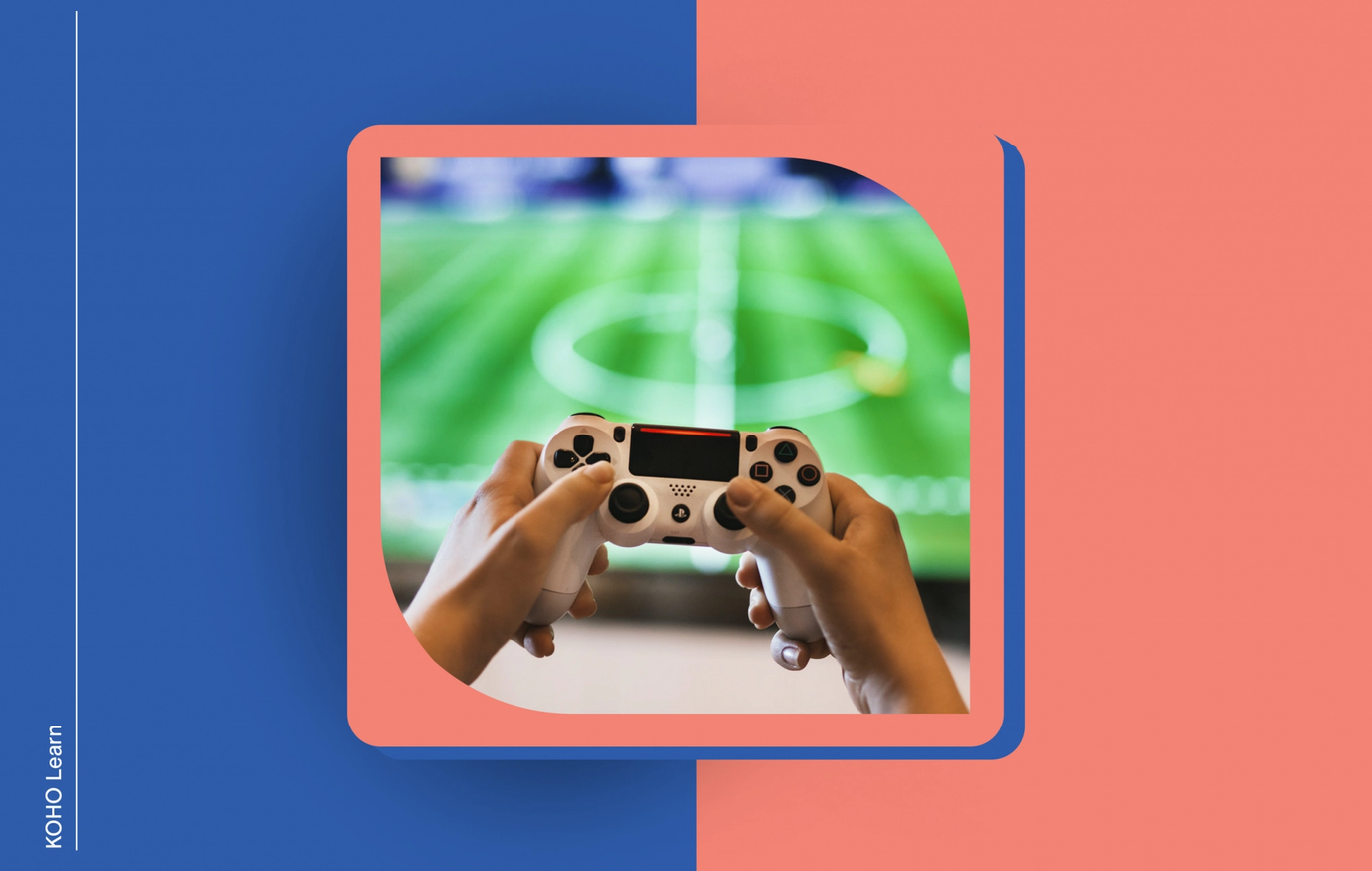Back to learn
Is gaming getting cheaper or more expensive?

Written By
Rounding it up
Gaming costs in Canada have been on the rise since 2020.
Factors responsible for this pricing change include country demographics, import tariffs, sales tax, and retro game collection.
There are new ways to spend less while still enjoying all your favourite games including getting a KOHO cash back card for gamers, opting for trade-ins, and working on a budget.
Read on for some tips for gaming on a budget.
So you’re finally ready to upgrade your video game consoles, and you're wondering “is gaming getting cheaper or more expensive?”
Before you dive into the rest of this article and decide whether the next decision you make will break the bank, here’s what you should know: gaming is getting more expensive, and the cost of both retro and new games have been rising since 2020 because many people started game collecting during the COVID-19 lockdowns. In December 2020, games were already more expensive in Canada than in the United States, with many costing more than $90 And gamers can expect to spend even more money in the coming months. Now that the Xbox Series X version of NBA 2K21 is sold for $90, other next-gen game companies are likely to follow suit, hiking their prices up from $79. Shawn Layden, the former head of Sony Interactive Entertainment Worldwide Studios already said next-gen video game pricing will rise because new generation consoles are more expensive to produce than previous ones.
In the next few minutes, I'll tell you why the gaming industry is making more money off of you and how you can fight back in your little way, reducing the amount you spend on games while still enjoying all the ones you love.

How much has game pricing changed?
Now, if you haven't purchased a new PlayStation or Nintendo in more than 5 years, you might believe the current pricing should still be a bit closer to what you paid the last time you bought a new game.
But the gaming industry didn't just raise the price yesterday or in December 2020. Since the coronavirus pandemic, the price of both new and old games has increased.
The Nintendo Switch, where you have The Legend of Zelda: Breath of Wild, Splatoon 2, Super Mario Odyssey, and Octopath Traveler was priced at $316.58 in 2020, which is a few dollars higher than $299, the launch price in 2017.
Xbox One cost $499.99 when it launched in 2013, but by 2020, the price was up to $555.
These are not the only games that have seen a price hike. PlayStation 4’s pricing went up from $399.99 in 2013 to $449. At the same time, Sony also raised the price of the Playstation Camera and DualShock 4 Controller from $59.99 to $64.99.
As you stare at these prices, you may think “they’re not so bad. I can still manage to get a game without dramatically shifting my budget.”
But you never just get one game. Your favourite games don’t all exist on the same console. You'll be buying more than one video game, and the extra price on each additional game adds up.
At launch, the PlayStation 5 was $629.99. This price will rise in Canada in the next few months as the demand for the console has exceeded the supply. The Chief Financial Officer, Hiroki Totoki, in a recent Sony Earnings call, said it is difficult to increase the production of the PS5 due to the shortage of semiconductors and other components. If you still choose to buy this game console, expect to put a dent in your wallet.
If you’re ready to save money while still enjoying these games, you may want to have the KOHO Game On virtual card in your wallet.
We’ll dive into the simple way this card works below. But first, why should you even consider paying more money for games when you could still enjoy the old ones you already have? And why are games getting more expensive in Canada in the first place?
Let's take a look.
Why are games getting more expensive in Canada?
The high prices of games in Canada result from various factors which include:
1. Sales tax
Online stores and gaming websites are responsible for paying taxes to the government. However, they don't take those taxes out of their profits. They add it to the game’s selling price.
This means if you're buying a new video game at $89, and the tax in your province is 13%, you'll see $100.57 as the final purchase price.
Although tax is usually a small amount, it still increases the cost of games and piles up when you purchase multiple games.
2. Retro game collection
The COVID lockdowns made more gamers crave the thrill of playing old video games. So they began to shop for more of these retro games. But this time, they didn't resell them. Most people stored these game collections in their homes.
As a result, the demand started exceeding the supply. Since there are only a few copies of retro games in circulation, their prices have increased.
3. Demographics
When shopping on Steam, you’ll discover that the price of games varies in different regions. This could be due to the exchange rate and other factors like the population in that area.
It’s speculated that gaming companies try to maximize their profits by increasing game costs in areas with low gaming populations. Since many people are not shopping for games in these areas, those who do pay more for them.
4. Import tariffs
A tariff is a tax paid on foreign goods. If you're buying games from outside the country, a tariff is added to the sales price of your game, making it cost more than it does in its original country.
For instance, if you ship PlayStation 5 from China or the United States to Canada, it would cost you more than it would in China, and the increase is reflected in the price even before adding shipping costs.
How can you deal with the high cost of getting new games?
These factors have made games costlier in Canada. However, you don't have to spend as much as others on these games.
Let's take a look at steps you can follow to save more money on games yearly.
Get a cash back card
Cash back credit cards help you earn money back on the purchases you make. Most cash back cards either restore a percentage of your spending or give you reward points. So, in other words, you get a discount or incentive for every purchase. Sounds great, right?
Some cash back cards only give you 1% cash back on every purchase. So if you spend $1,000 on new consoles, you save $10. The more you spend, the higher your savings.
The best cash back credit card for gamers in Canada is the KOHO ultimate cash back card for gamers. Trumping other credit cards that give a small percentage as cash back, KOHO gives gamers 5% cash back on all games purchased with the virtual reward card.
So if you spend $500 on a new console, KOHO will give you $25 back on your purchase. With this card, you could save hundreds of dollars on all your gaming purchases.

Opt for Trade-ins
If you play games quickly and get new ones immediately after, trade-ins will allow you to save money and spend less on new games.
“What are trade-ins?” you ask?
This is a way to exchange your games and accessories for money to get new ones.
Various stores in Canada offer a trade-in program. All you have to do is:
Take your game including its accessories, manuals, and packaging to the store offering a trade-in program.
Get your device valued. The store owners will give you a price estimate for your games.
Get cash or a gift card. Some stores will not give you cash, so you only get a gift card to purchase new games.
If you don't return to old games after playing them, why not sell them? Trade-ins allow you to spend so much less on new games and prevent waste.
Plan for it
You might have heard this several times, but budgeting is always important. A budget saves you from spending extra money on games that you may not enjoy and depriving yourself of other things you need.
Before you buy a new game, make sure you have money set aside for it. If you're not sure the game will be worth the price, wait until reviews start coming in before you make the purchase.
Opt for physical over digital games
If you're not buying a video game on its launch day, don't buy the digital version. Both physical and digital games are set around the same price at launch but, after a while, the physical games become cheaper.
Also, after completing the physical games, you can easily sell them or do trade-ins to get your money back for new games. This way, you won't spend as much money, and you always have new games to play.
Digital games may last longer and also be more convenient as you can access them anywhere and they're always in stock. But, you can save more money with physical games.
Gaming is getting more expensive… but that doesn’t have to keep you from playing
Although game pricing has increased for various reasons, these tips will help you save money on games.
With the KOHO cash back card for gamers, you can now earn back 5% of every amount you spend on games. As you buy new games, you can also save more money by trading in old games you no longer play and choosing physical games over their digital versions.

Jake Victor
Jake is a financial content copywriter who enjoys sharing ways to save money, invest, and make more money on blogs and financial publications. When he's not writing, he's training newbie writers and helping business owners make more money.